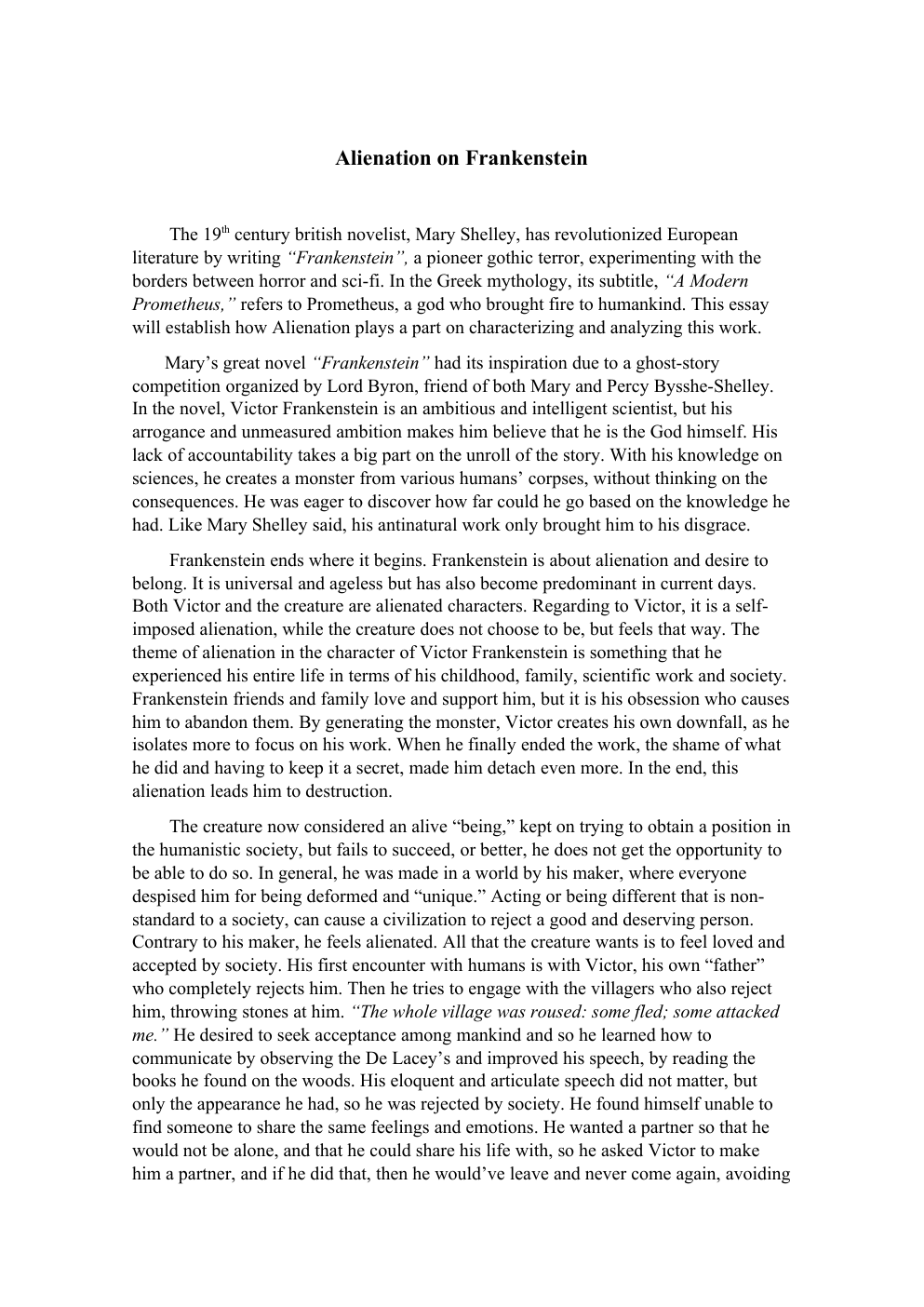Aliénation on Frankenstein
Publié le 30/05/2023
Extrait du document
«
Alienation on Frankenstein
The 19th century british novelist, Mary Shelley, has revolutionized European
literature by writing “Frankenstein”, a pioneer gothic terror, experimenting with the
borders between horror and sci-fi.
In the Greek mythology, its subtitle, “A Modern
Prometheus,” refers to Prometheus, a god who brought fire to humankind.
This essay
will establish how Alienation plays a part on characterizing and analyzing this work.
Mary’s great novel “Frankenstein” had its inspiration due to a ghost-story
competition organized by Lord Byron, friend of both Mary and Percy Bysshe-Shelley.
In the novel, Victor Frankenstein is an ambitious and intelligent scientist, but his
arrogance and unmeasured ambition makes him believe that he is the God himself.
His
lack of accountability takes a big part on the unroll of the story.
With his knowledge on
sciences, he creates a monster from various humans’ corpses, without thinking on the
consequences.
He was eager to discover how far could he go based on the knowledge he
had.
Like Mary Shelley said, his antinatural work only brought him to his disgrace.
Frankenstein ends where it begins.
Frankenstein is about alienation and desire to
belong.
It is universal and ageless but has also become predominant in current days.
Both Victor and the creature are alienated characters.
Regarding to Victor, it is a selfimposed alienation, while the creature does not choose to be, but feels that way.
The
theme of alienation in the character of Victor Frankenstein is something that he
experienced his entire life in terms of his childhood, family, scientific work and society.
Frankenstein friends and family love and support him, but it is his obsession who causes
him to abandon them.
By generating the monster, Victor creates his own downfall, as he
isolates more to focus on his work.
When he finally ended the work, the shame of what
he did and having to keep it a secret, made him detach even more.
In the end, this
alienation leads him to destruction.
The creature now considered an alive “being,” kept on trying to obtain a position in
the humanistic society, but fails to succeed, or better, he does not get the opportunity to
be able to do so.
In general, he was made in a world by his maker, where everyone
despised him for being deformed and “unique.” Acting or being different that is nonstandard to a society, can cause a civilization to reject a good and deserving person.
Contrary to his maker, he feels alienated.
All that the creature wants is to feel loved and
accepted by society.
His first encounter with humans is with Victor, his own “father”
who completely rejects him.
Then he tries to engage with the villagers who also reject
him, throwing stones at him.
“The whole village was roused: some fled; some attacked
me.” He desired to seek acceptance among mankind and so he learned how to
communicate by observing the De Lacey’s and improved his speech, by reading the
books he found on the woods.
His eloquent and articulate speech did not matter, but
only the appearance he had, so he was rejected by society.
He....
»
↓↓↓ APERÇU DU DOCUMENT ↓↓↓
Liens utiles
- Frankenstein de Mary Shelley
- aliénation n.
- ALIÉNATION
- FRANKENSTEIN 90
- commentaire Frankenstein p. 119 à 122


